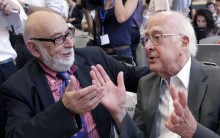Winners of the Nobel Prize for Physics of 2013 were announced on October 8. This year’s laureates are Belgian Professor Francois Englert and Scottish Professor Peter Higgs. The Prize was awarded for the discovery of the Higgs boson by experiments at the Large Hadron Collider.
Right after the announcement of the names of the laureates, the head of the State Agency on Science, Innovations, and Informatization Volodymyr Semynozhenko said that Ukrainian scientists had a connection to the discovery of the Higgs boson. “The key element of the system – special detector – was successfully designed and developed thanks to the discovery of a unique scintillator (PWO) made by scientists from the Ukraine’s National Institute of Monocrystals. The scintillator made it possible to record high-energy particles and, in fact, the Higgs boson. In 17 years from the discovery to practical implementation of the project hundreds of Ukrainian scientists were involved in its development. Today, the team of nuclear physicists, which recently discovered Higgs boson thanks to the Hadron Collider, includes 46 Ukrainian scientists.” Semynozhenko stressed that awarding the Nobel Prize for this invention also means recognition of the achievements of the Ukrainian science.
This is not the only good news for the scientific community in Ukraine. Recently Ukraine has become an associate member of the European Organization for Nuclear Research (CERN) – the world’s largest laboratory for high energy physics (this is where the Large Hadron Collider was built). It is an important moment for Ukrainian science because our scientists have been working at CERN for a long time already. Now, this cooperation will move to a new level.
“It is a clever decision. It has not appeared just today – this association agreement was signed for the first time by Serhii Riabchenko – then chairman of the State Committee on Science, in 1993. But due to sluggishness of our state officials we lost this status by the end of the 1990s and then have had long negotiation process for its renewal. Fortunately, now this finally ended with a success and it is very important that Ukraine became a full-time member, because in the vast majority of research programs in the world that are being implemented at the time we do not even have a status of an observer,” Maksym Strikha, Ph.D. in Physics and Mathematics, president of the Ukrainian Physics Society explained to The Day.
According to scientists and experts, today many Ukrainian scientists work in foreign laboratories. Many of them are involved in various important discoveries and world-class developments. At the same time, as Strikha rightly observed for The Day, this success cannot be credited as the success of our country. On the contrary, all the prominent things achieved in Ukrainian science or with the participation of Ukrainian scientists happen despite Ukraine’s state policy in the sphere of science. The state not only makes no investments in science, but it also cuts spending from the state budget for this sphere every year. According to Strikha, the draft budget of the Ukraine’s National Academy of Science for 2014 states the funding that is different from the last year’s by 170 million hryvnias not in favor of the Academy… This is taking place despite the fact that the funds allocated from the state budget for 2013 covered only the utilities and salaries of the employees of the National Academy of Sciences. There is no way we can speak of a Nobel Prize for Ukraine with the current funding cuts for the National Academy of Sciences.







